Kansa or Kansya is a type of traditional bronze or bell metal that is widely used in India for making various utensils, particularly in Ayurvedic cooking. It is an alloy of copper and tin in the ration 78% Copper to 22% tin.
History of Kansa in India
The use of Kansa (bell metal) in India has a rich and ancient history, dating back thousands of years. Kansa has been an integral part of Indian culture, particularly in the fields of metallurgy, art, and traditional medicine (Ayurveda). Here is an overview of the history of Kansa's use in India:
- Early Beginnings: The use of Kansa can be traced back to the Bronze Age, around 3300 BCE, when copper and tin alloys were first developed by early human civilizations. Kansa is believed to have been one of the earliest metal alloys used by ancient Indian societies.
- Bronze Age India: During the Indus Valley Civilization (2600–1900 BCE), ancient inhabitants of the region, including present-day India, Pakistan, and parts of Afghanistan, used Kansa to create a variety of artefacts and utensils. Archaeological excavations have uncovered Kansa objects such as utensils, weapons, jewellery, and figurines from this era.
- Art and Sculpture: Ancient Indian artisans used Kansa to create exquisite sculptures and statues. The metal's malleability and durability made it a preferred choice for crafting religious idols and decorative pieces.
- Ayurvedic Medicine: The use of Kansa in Ayurvedic medicine can be traced back to the ancient texts of Ayurveda, which are over 5,000 years old. Ayurvedic practitioners recognized the health benefits of Kansa and its positive effects on the body.
- Traditional Utensils: Over the centuries, Kansa has been widely used to craft traditional Indian utensils including servewares like thalis (plates), katoris (bowls), glasses, and pans for cooking. These kansa utensils were not only functional but also considered to have health benefits according to Ayurvedic principles.
- Ayurvedic Treatments: In addition to utensils, Kansa has been used in Ayurvedic treatments like Kansa massage, where special Kansa wands or tools are used to stimulate marma points on the body. This therapy is believed to have various therapeutic effects.
- Cultural Significance: Kansa holds cultural and religious significance in India. It is often used in religious ceremonies and offerings due to its association with purity and auspiciousness.
- Regional Variations: Different regions in India have their own traditions and methods of using Kansa. For example, in certain parts of India, Kansa is used extensively for cooking, while in others, it may be more prevalent in traditional medicine and cultural practices.
Throughout history, Kansa has continued to be an important material in various aspects of Indian life, connecting tradition, art, health, and spirituality. While modern materials have replaced Kansa in some contexts, its cultural and historical significance remains strong, and its traditional use in Ayurveda and other practices continues to be valued in many parts of India.
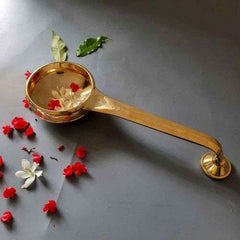
Ayurvedic Significance of Kansa: Benefits
In Ayurveda, the use of Kansa (bell metal) utensils, including kansa thalis, cups, and bowls, is believed to offer various health benefits. This traditional wisdom has been passed down through generations and is rooted in Ayurvedic principles. Here are some key aspects of the traditional wisdom behind the use of Kansa in Ayurveda:
- Balancing Doshas: Ayurveda classifies individuals into different dosha types-Vata, Pitta, and Kapha. It is believed that using Kansa utensils helps balance the doshas. The cooling properties of Kansa are thought to pacify excess Pitta (fire element), while the grounding nature helps to balance Vata (air and ether elements) and Kapha (earth and water elements).
- Improved Digestion: Ayurveda emphasizes the importance of good digestion for overall health. It is believed that eating food from Kansa utensils can aid digestion by promoting the production of digestive enzymes and supporting the digestive fire (agni).
- Alkalising Effect: Kansa is alkaline in nature, and Ayurveda suggests that consuming food and beverages from Kansa utensils may help balance the body's pH levels, which can positively impact health.
- Detoxification: Kansa is said to have detoxifying properties. When certain foods react with the Kansa metal, small amounts of the metal might get ingested. These trace amounts of Kansa are believed to help cleanse the body of toxins and heavy metals.
- Enhanced Flavours: It is believed that Kansa utensils enhance the flavours of food. The metal's unique properties are said to bring out the natural taste of the ingredients, making the dining experience more enjoyable.
- Anti-Inflammatory Properties: Kansa is thought to possess anti-inflammatory properties, which can be beneficial for health, especially for individuals with inflammatory conditions.
- Stimulation of Marma Points: According to Ayurveda, the application of Kansa on specific marma points (vital energy points) during Ayurvedic treatments like Kansa massage is believed to have therapeutic effects on the body and mind.
- Heat Distribution: Kansa has excellent heat distribution properties, ensuring that food stays warm for a longer duration when served in Kansa utensils.
It's important to note that while Kansa utensils are popularly used and respected in Ayurveda, scientific studies validating all of the claimed benefits are limited. Some modern research is underway to understand the significance of these metals in our daily usage. https://www.ncbi.nlm.nih.gov/pmc/articles/PMC3131772/
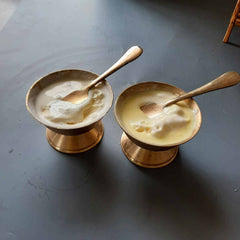
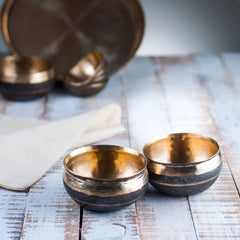
History of Traditional Clusters famous for Kansa
In India, there are several artisan clusters known for their expertise in crafting Kansa (bell metal) utensils and artefacts. These clusters have passed down their traditional knowledge and skills through generations, contributing to the rich cultural heritage associated with Kansa. Here are some of the prominent artisan clusters known for making Kansa in India:
- Puri, Odisha: Puri, a coastal city in Odisha, has a thriving metalworking community that includes skilled Kansa artisans. They create a range of Kansa items, including utensils used in temple rituals and traditional cooking.
- Navsari, Gujarat: Navsari, a city in Gujarat, is famous for its Kansa utensils. The artisans here produce a variety of Kansa cookware and serving dishes that are highly valued for their traditional and Ayurvedic significance.
- Moradabad, Uttar Pradesh: Moradabad is a well-known centre for metalwork in India, and it is also renowned for producing Kansa items. Artisans in Moradabad create a wide range of Kansa utensils, decorative pieces, and religious artefacts.
- Jaipur, Rajasthan: Jaipur, the capital city of Rajasthan, has a significant presence of Kansa artisans. They are skilled in crafting beautiful Kansa thalis, cups, and bowls, often adorned with intricate designs and engravings.

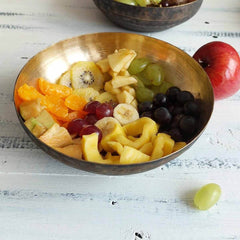
How to use and maintain Kansa
Using and maintaining Kansa (bell metal) utensils, such as thalis (plates), cups, and bowls, involves certain practices to preserve their quality and enjoy their potential health benefits. Here are some guidelines on how to use and maintain Kansa:
Before First Use:
- Wash the Kansa utensils with warm water and mild soap to remove any impurities or residues from the manufacturing process.
- Rinse thoroughly and dry with a soft cloth.
Seasoning: Not Mandatory
Seasoning is generally not required for kansa but some traditional knowledge documented from certain communities is shared below:
- To enhance the taste and preserve the quality of Kansa utensils, it's recommended to season them before regular use.
- Heat the Kansa utensil on low to medium heat for a few minutes with ghee (clarified butter) or any cooking oil.
- Let it cool, then wipe off the excess oil with a soft cloth.
- This process helps create a natural non-stick surface and prevents food from sticking to the utensil.
Cooking and Serving:
- Kansa utensils which are made by casting model (Done in South India) can be used for cooking, especially for dishes that benefit from its unique properties, like certain Ayurvedic recipes. Kansa made by beaten form is not advisable for cooking. You can use it only for reheating food or serving.
- Avoid using Kansa utensils cooking for highly acidic or alkaline foods, as these may react with the metal.
- When serving hot food, use caution, as the utensils can become quite hot.
Cleaning:
- Hand wash Kansa utensils with warm water and mild soap immediately after use.
- Avoid using abrasive scrubbers or harsh cleaning agents that could damage the Kansa's surface.
- If food is stuck, soak the utensil in warm soapy water before cleaning.
Polishing:
- Over time, Kansa may develop a natural patina or tarnish. Some people prefer the antique look, while others prefer the shiny appearance.
- If you prefer the shine, you can occasionally polish the Kansa utensils using natural ingredients like tamarind paste or a mixture of baking soda and lemon juice.
- Always wash the utensils thoroughly after polishing to remove any residue.
Avoid Dishwashers and Microwaves:
- It's best to avoid using Kansa utensils in dishwashers or microwaves, as these can damage the metal or affect the seasoning.
Remember that Kansa utensils may require more care compared to other types of cookware. Following these practices can help you maintain the quality of Kansa and enjoy its potential benefits for a long time. If you're unsure about any specific care instructions for your Kansa utensils, consult the manufacturer's guidelines or seek advice from a reputable source.
Read our Blog Exploring The World of Bronze Cookware!

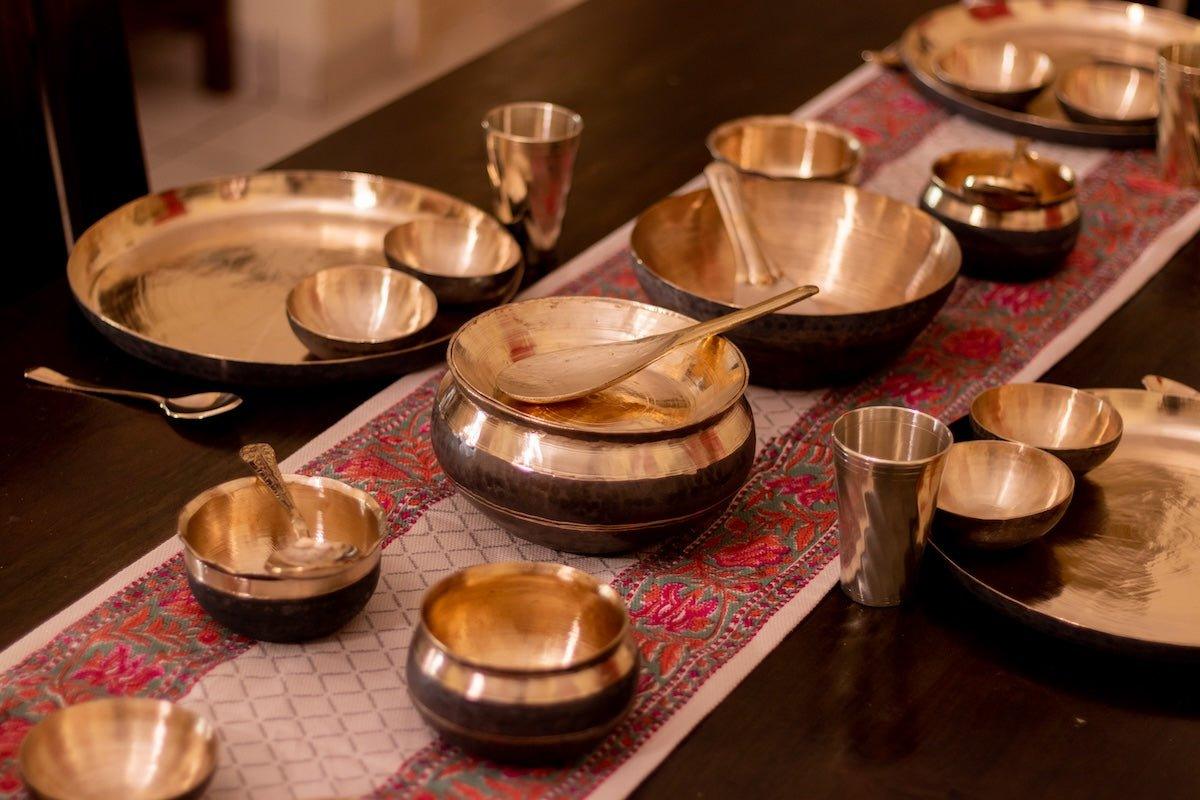
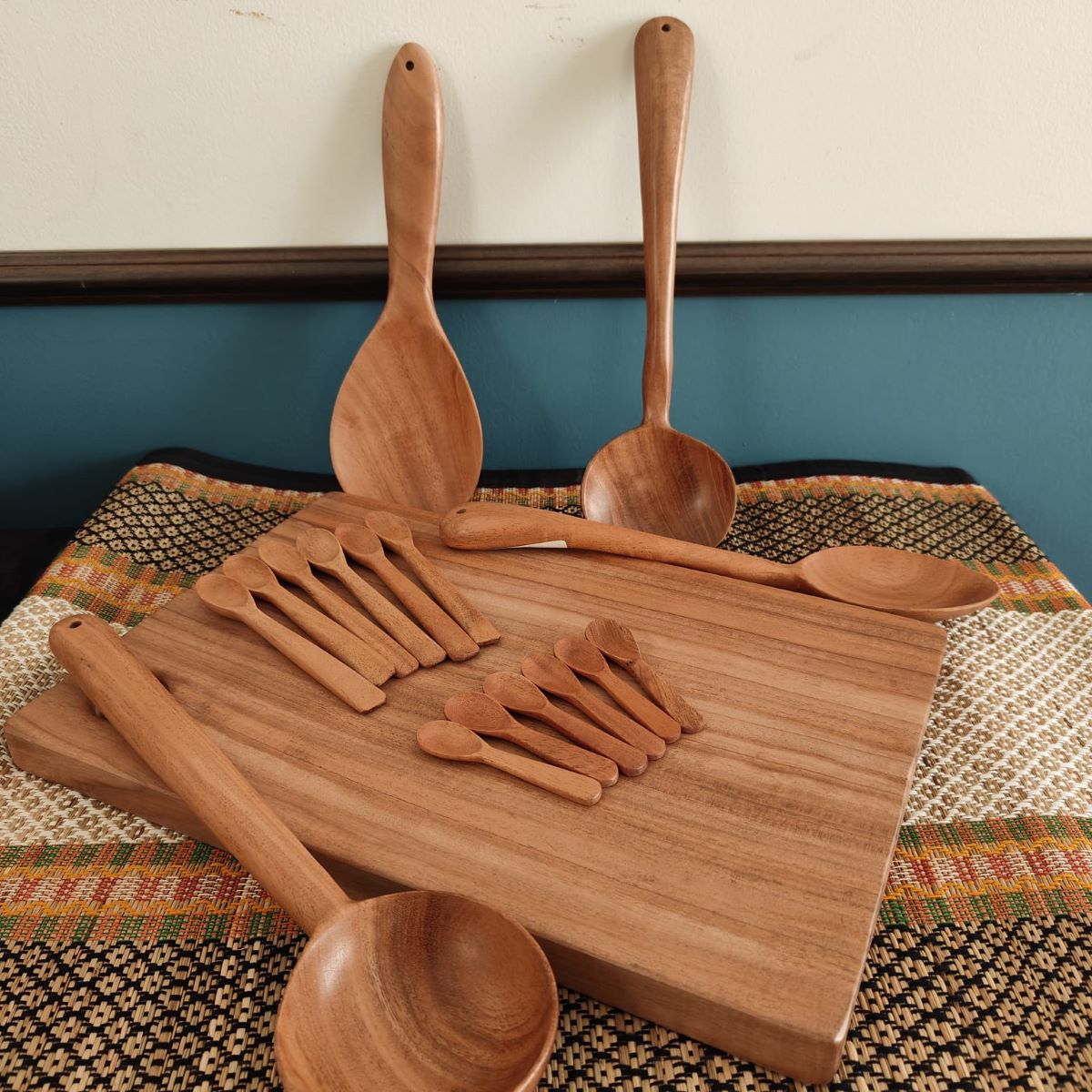

3 comments
Kavitha
Basic Pooja items like bell, jagante(kannada ) kalsha, taale, karpoora belago item, and many more items related to Pooja. I have immense respect towards zista. I looking forward.
Lakshmi Kalyani G
I want puja samaan it’s not available in this site but it’s good
Manisha
What are the tips to identify pure kansa utensils.
Thank you
Leave a comment
All comments are moderated before being published.
This site is protected by hCaptcha and the hCaptcha Privacy Policy and Terms of Service apply.